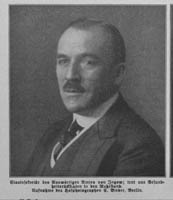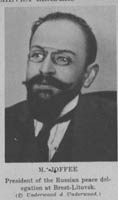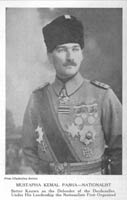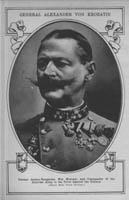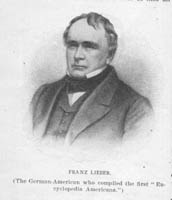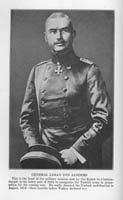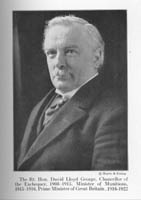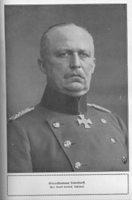Table of Contents
Key Figures
Statesmen
a | b | c | d-e | f | g | h-i | j-l | m | n-o | p | r | s | t-v | w-y
Gottlieb von Jagow (1863-1935)
A German statesman, von Jagow served as the German Ambassador to Italy from 1909 to 1913. He played an important role in the renewal of the Triple Alliance in 1912 between Germany, Austria-Hungary, and Italy. Von Jagow became State Secretary of Foreign Affiars in 1913 and Prussian Secretary of State in 1914. He negotiated with the Austrians during the July Crisis of 1914 after the assassination of Archduke Franz Ferdinand, the spark which set off World War I. Alfred Zimmermann replaced von Jagow as Foreign Secretary in November 1916.
Ioffe Joffre
As the unofficial Soviet ambassador to Germany in the early days of the Weimar Republic, Joffre conducted an intense propaganda campaign to support the Bolshevik regime. Joffre led a powerful propaganda center in Vilna, Lithuania and sought to indoctrinate Russian prisoners of war in German prison camps with Bolshevik ideology. The Allies prevented the repatriation of large numbers of Russian POW's as part of the November 1918 Armistice terms and an ideological war emerged in these prison camps. Joffre challenged the War Prisoners' Aid program promoted by the American YMCA for Russian prisoners. Joffre later served as the Soviet ambassador to China, Austria, and Japan during his diplomatic career.
Mustapha Kemal Pasha (Kemal Atatürk) (1881-1938)
A Turkish general and statesman, Mustapha Kemal first distinguished himself against the Italians in the Turkish-Italian War in Tripoli in 1911. He commanded the Turkish forces in the valiant defense of Gallipoli against the British in 1915 and repulsed a Russian offensive in Armenia in 1916. Promoted to brigadier general in 1916, he commanded the Turkish Seventh Army in Palestine against the British in 1918. Mustapha Kemal was deeply disillusioned by the terms of the Allied armistice in October 1918, which effectively dissolved the Ottoman Empire. He actively supported Turkish nationalism in opposition to the Allied occupation forces and the Sultan in Constantinople. In 1919, Mustapha Kemal called the National Congress of Turkish Provinces at Erzurum. He resigned from the army and was elected president by the National Congress. Mustapha Kemal established the headquarters of the nationalist movement in Angora (Ankara) after the British occupation of Constantinople (Istanbul) in 1920. Mustapha Kemal rejected the Treaty of SPvres in June 1920, which dismembered the Ottoman Empire. As president and prime minister, he proclaimed the state of Turkey and led the Turkish Army in a series of successful military campaigns. He defeated the Armenians, Georgians, and French, regaining lost territory, and decisively defeated the Greeks in 1922. Mustapha Kemal's growing power forced the British to withdraw from Asia Minor and secured Turkey's independence and national borders in the Treaty of Lausanne in 1923. Mustapha Kemal formed the People's Republican Party and proclaimed Turkey a republic in 1923. Elected president the same year, Mustapha Kemal abolished the Caliphate in 1924 and introduced Western reforms, including the closing of Islamic monasteries and other institutions, introduced civil and cultural reforms, required secular education and Western dress, adopted the Roman alphabet in place of Arabic, abolished polygamy, and passed a law requiring the use of family names. Mustapha Kemal served as president of Turkey from 1923 to 1938.
Mahmoud Kiamil Pasha
State Secretary of Turkey near the end of the war, Enver Pasha instructed Mahmoud Kiamil to negotiate with Christian Phildius in January 1918 regarding the introduction of World's Alliance War Prisoners' Aid services for Allied POW's in the Ottoman Empire. Mahmoud Kiamil organized the meeting between Phildius and Turkish officials representing the Ministry of War and Red Crescent Society.
Kiemal Bey
A major in the Turkish army, Kiemal Bey was the Director of the War Prisoners' Section of the Ministry of War (he was the Turkish equivalent of General Friedrichs in the German Ministry of War). Kiemal Bey participated in the January 1918 conference between Christian Phildius and other Turkish officials. After consultation with Enver Bey, Kiemal Bey authorized the World's Alliance to begin War Prisoners' Aid operations in Turkish prison camps on behalf of Allied POW's. Under this preliminary agreement, the World's Alliance could dispatch three neutral secretaries to begin WPA work. This agreement provided the YMCA with access to POW camps, labor detachments, and hospitals and permitted the establishment of a full WPA program. Kiemal Bey, however, rejected Johannes Van Bommel as a WPA Secretary, due to the Dutch YMCA worker's previous work with the American Association.
Major General Kretzschmer
A German general officer, Kretzschmer was the commandant of the prison camp at Cottbus (III Army Corps). Conrad Hoffman assigned J. Gustav White to develop War Prisoners' Aid services at Cottbus and White found Kretzschmer to be a Christian with a deep interest in the welfare of prisoners of war. Kretzschmer presided at the inauguration of the YMCA hall at Cottbus in 1915.
Alexander von Krobatin (1849-1933)
An Austro-Hungarian field marshal and statesman, Krobatin served as Austria-Hungary's Minister of War from 1912 to 1917. He was an expert in artillery and taught at the Technical Military Academy from 1877 to 1882. In 1896, he received an appointment to the Ministry of War and became a major general in 1900. Krobatin became the Minister of War in 1912 and, during the July Crisis of 1914, he strongly advocated the declaration of war against Serbia, in support of the Chief of Staff, Konrad von Hotzendorf. As the Minister of War, Krobatin was responsible for transforming the Dual Monarchy's economy for total war. While he tripled the amount of artillery available at the divisional level, he was less effective in producing the military requirements for the Austro-Hungarian Army. Archibald Harte met with Krobatin in August 1915 after his first inspection trip of Russian prison camps in Siberia to report on conditions and to gain the YMCA access to Austro-Hungarian prisons. Impressed with the scope of War Prisoners' Aid relief, Krobatin approved Harte's proposal, which included immediate access by four American WPA secretaries to Dual Monarchy prison camps, and provided funds for the support of relief services for Austro-Hungarian POW's in Russia. With the dismissal of Konrad in March 1917, Krobatin was politically exposed and he requested a transfer to a military command. In April 1917, he gained command of the Tenth Army on the Italian Front. In October 1917, he achieved a great victory at the Battle of Caporetto which led to the capture of two Italian divisions and forced the Italians to retreat across the Piave River. Krobatkin was promoted to field marshal in November 1917 for his efforts. Krobatkin, in command of the Tenth and Eleventh Armies, was unable to replicate his victory at the Battle of the Piave in 1918. Instead, his force was decimated by the Italian offensive at the Battle of Vittorio Veneto in November 1918, after the Italian government rejected an armistice proposal offered by the Dual Monarchy.
General de Lessow
A German general during the Great War, de Lessow was the German Military Plenipotentiary in the Ottoman Empire by the end of the conflict. In January 1918, de Lessow arranged an interview between Christian Phildius and Enver Pasha which would allow the World's Alliance to set up War Prisoners' Aid operations for Allied POW's in Turkey.
Francis Lieber (1800-1872)
Lieber was born in Berlin, Germany and the authorities imprisoned him as a radical in 1819 and 1824. He fled to England in 1826 and continued on to the United States the next year. He planned and edited the Encyclopedia Americana (1829-1833) and served as a Professor of History and Political Economy at South Carolina College, Columbia University, and the Columbia University Law School. Lieber wrote a number of political and legal tracts, including A Code for the Government of Armies in 1863, which was revised and issued by the U.S. War Department as Instructions for the Government of Armies in the Field, General Orders No. 100. These works addressed the treatment of prisoners of war by the Union army during the Civil War.
Otto Liman von Sanders (1855-1929)
A German general and Turkish field marshal, Liman von Sanders established his reputation with the Turkish Army. He was born in Pomerania and rose to the rank of lieutenant general in the German Army by 1911. The German government sent Liman von Sanders to Constantiople as the head of the German Military Mission in 1913, where he received the rank of field marshal in the Turkish Army. When the Ottoman Empire joined the Central Powers in November 1914, he essentially assumed control of Turkish forces. Liman von Sanders prevented the Allied attempt to force the Dardenelles and contained the amphibious assault at Gallipoli in 1915, a major victory for the Turks. As the war dragged on and the Ottoman armies disintegrated, he assumed command of the Turkish Army in Palestine in 1918, but was unable to stop the British offensive into Syria, due to the lack of equipment and troops. The British decimated Liman von Sanders' army and was about to invade Anatolia in October 1918 when the Ottoman government signed an armistice with the Allies.
David Lloyd George (1863-1945)
A British statesman, Lloyd George became a solicitor in 1884 and started his political career by winning a seat in Parliament in 1890. He established a reputation as a great debater and became president of the Board of Trade in 1905. He rose further in government, becoming the Chancellor of the Exchequer in 1908. When Britain went to war, Lloyd George was instrumental in placing Britain on a war economy. He served as Minister of Munitions in 1915, a critical position as the British Expeditionary Force experienced a shortage of shells, and became the Secretary of State for War in 1916, after the death of Field Marshal Horatio Herbert Kitchener. In response to the stalemate on the Western Front and military failures against the Turks, Lloyd George replaced Herbert Henry Asquith as Prime Minister in 1916, a position he would hold until 1922. Lloyd George became the virtual dictator of the British war effort and directed military policy to focus on victory on the Western Front. After the defeat of Germany in November 1918, Lloyd George was a member of the "Big Three" (with Woodrow Wilson of the United States and Georges Clemenceau of France) at the Versailles Peace Conference. Lloyd George reflected a middle ground between Wilson's liberalism and Clemenceau's vindictiveness in the formulation of the peace treaty. During the post-war period, Lloyd George had to address the Greek debacle against the Turks in Asia Minor and unrest in Ireland. He began negotiations with the Irish which led to the establishment of the Irish Free State in 1921.
Erich F. W. Ludendorff (1865-1937)
A German general, Ludendorff was one of the best tacticians during World War I. Unlike other Prussian generals, Ludendorff lacked an aristocratic background and slowly rose through the ranks. When the war erupted in August 1914, Ludendorff was the deputy chief of staff for the Second Army but won instant fame by his lightning seizure of the fortress at Liege in Belgium. He was promoted to chief of staff of the Eighth Army in East Prussia and joined General Paul von Hindenburg to halt the unanticipated Russian invasion. Ludendorff and Hindenburg became a team; they successfully stopped the Russian advance at Tannenberg and destroyed two Russian armies in the Battle of the Masurian Lakes in 1914. The pair directed the German invasion of Russian Poland in 1915 and became national heroes. When Field Marshal Erich von Falkenhayn's Verdun offensive failed on the Western Front in 1916, Kaiser Wilhelm II appointed Hindenburg as the new imperial Chief of Staff and Ludendorff became the Quartermaster General of the German Army. Ludendorff played a critical role in formulating the strategies for the invasions of Serbia (1915), Romania (1916), and Italy (1917), which knocked Serbia and Romania out of the war. While Hindenburg remained the nominal leader, Ludendorff was the power behind the scenes and organized the domestic economy into a total war effort. The pair became the virtual military dictators of Germany during the last two years of the war. After approving the resumption of unrestricted submarine warfare, which brought the United States into the war on the side of the Allies, Ludendorff made a desperate gamble and threw all of Germany's resources against the Western Front in the Spring of 1918. While the Germans achieved impressive gains, they were unable to break the Allied lines and the offensive ground to a halt by the summer. Recognizing that the war was over, Ludendorff recommended that the imperial government negotiate an armistice on any terms. He resigned his commission in October 1918 and fled to Sweden. In 1919, Ludendorff returned to Germany and lived in Munich. Ludendorff joined reactionary conspiracies against the Weimar Republic and participated in the Kapp Putsch in 1920 and Adolf Hitler's Beer Hall Putsch in 1923. During the last years of his life, Ludendorff embraced a wide range of political ideologies, eventually becoming a pacifist.
W. von Lübbers
A German officer, Captain von Lübbers was assigned to the Department of Prisoners of War in the Ministry of War early in World War I. Von Lübbers served as the military escort to Archibald Harte and Christian Phildius as they made their initial investigations of German prison camps in March 1915. Von Lübbers was assigned to the original German YMCA War Prisoners' Aid committee in May 1915, which Harte established to lay the basis for POW relief services for Allied prisoners in Germany.
